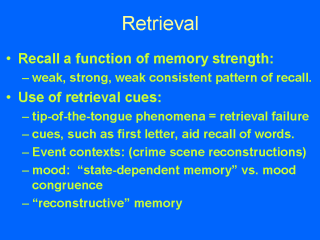| front |1 |2 |3 |4 |5 |6 |7 |8 |9 |10 |11 |12 |13 |review |
 |
Recall seems to depend on the
strength of the memory trace. The pattern of recall isnít what you would expect,
however. It isnít just the strong memories that are recalled in preference to the weak,
but instead there seems to be a pattern of alternate recall of strong and weakly stored
items. The implications of this are not fully understood. Cues aid retrieval. There are numerous examples, many of which are used by you daily, and some of which are used professionally to aid recall. Giving the first letter of a word aids its recall - these cues are very important in everyday remembering. Context dependent recall - cued by the setting in which the information was encountered (may be physical, psychological, social or other). Mood-dependent recall - state-dependent learning and recall (alcoholics who, when sober, cannot remember what happened when drunk, recall their experiences when they again drink - the intoxicated state seems to act as a cue somehow). Mood congruence is where a happy person preferentially recalls happy memories, while a depressed person preferentially recalls negative experiences. Memory is reconstructive - that is there is interpretation and elaboration, then reconstruction from this elaboration, which can change significantly the details recalled. This is a problem for humans. |